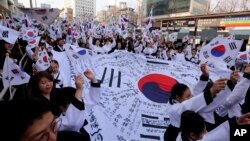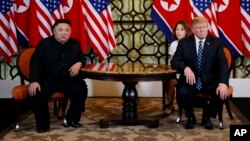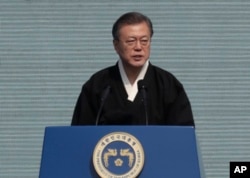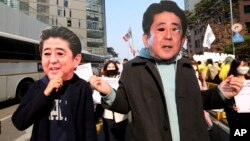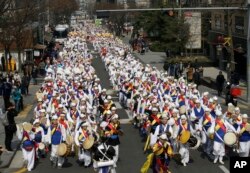South Korean President Moon Jae-in stressed the importance of a unified Korea, peace, and moving past the 1910-1945 period of Japanese rule during an event to commemorate the 100th anniversary of the March First Independence Movement against Japanese occupation of the peninsula.
“Overcoming colonial rule, war, poverty and dictatorship, we have accomplished miraculous economic growth,” Moon said Friday at an official event marking the birth of the Korean independence movement.
“On that day (March 1, 1919), we were reborn as citizens of a republic; we were no longer subjects of a dynasty or a colony of Imperial Japan. The great journey toward a democratic republic began at that time looking beyond independence and liberation,” he said.
North Korea
Moon also discussed his North Korean engagement policy.
“Last year, I met with Chairman Kim Jong Un for the first time at Panmunjom and, by bringing the minds of 80 million Koreans together, we proclaimed to the whole world that an era of peace has dawned on the Korean Peninsula,” Moon proclaimed, noting that “shots are no longer heard in the sky, on the land and across the seas.”
While the second summit between Kim and U.S. President Donald Trump ended in Hanoi without an agreement between Pyongyang and Washington, Moon remained optimistic.
He said that summit “made meaningful progress” leading to “enhanced mutual understanding and built more trust” between the two nations.
“I have high regard for President Trump, who has expressed his commitment to continuing talks and optimistic views,” Moon said.
He also clarified his vision of unification as one “achieving a unity of mind while acknowledging differences and establishing mutually beneficial relations.”
Moon also discussed promoting peace on the peninsula and the financial benefits he was certain would follow.
He said, “Peace on the Korean Peninsula will serve as a new driving force for economic growth, which will not only impact both Koreas but also encompass Northeast Asia, ASEAN and Eurasia.”
Japan
The South Korean president also addressed the discrepancies of historical events chronicled by Seoul and Tokyo.
“The task of setting history right is what is needed to help our future generations stand tall. Firmly upholding the national spirit is the state's responsibility and duty,” he said.
Bilateral ties between Seoul and Tokyo have soured in recent months after the Moon administration dissolved a fund set up by Japan to assist surviving “comfort women” during World War II and court decisions ordering Japanese companies to compensate the victims of forced labor.
Tokyo says both matters were resolved in 1965, when South Korea and Japan resumed formal diplomatic relations.
Grant Newsham, senior research fellow at the Japan Forum for Strategic Studies in Tokyo, said many independence movement celebrations tend to have elements of “ethnocentrism or nationalism in them.”
“Besides sort of instilling or recreating some sort of domestic or national pride, one often does think of who it is nearby that you don't like all that much, and for [historical] reasons, you may have some resentment toward them,” he said.
The Institute for Far Eastern Studies at Kyungnam University's Cho Jin-goo noted it was previously important to cooperate closely with Japan because of regional security issues security when Seoul was a weaker country.
Even though he states a gap in power still exists, “the Korean side can raise their voice to Japan, in comparison with the past situation,” allowing Seoul to address issues related to the past.
However, Yang Ki-ho in the Department of Japanese Studies at Sungkonghoe University struck a more positive tone regarding future relations with Tokyo.
He said the Moon administration has undertaken a “dual approach” with Japan to try and address past and present issues independently.
“In that sense,” Yang said, “the March First Movement anniversary event could be a turning point. ... It should be considered as a positive, futuristic point instead of a negative criticism to Japan.”
Although he did also mention that “it is inevitable to experience some conflicts between [South] Korea and Japan,” attributing that to a “lack of communication and misunderstanding.”
While the events taking place throughout South Korea won't necessarily improve or harm relations, Newsham said, he pointed out that bilateral ties are “not entirely bad.”
“You know, in some parts of it, particularly in the military to military. It's actually always been pretty good,” he said.
But Cho does see some possibilities for ties to further worsen in the coming months.
He said that's when Japan revises its school textbooks, often claiming sovereignty over islets both nations assert as their own (referred to as Takeshima in Japan, Dokdo in South Korea, and the Laincourt Rocks internationally) and lawmakers make an annual pilgrimage to the controversial Yasukuni Shrine.
Lee Ju-hyun contributed to this report.




